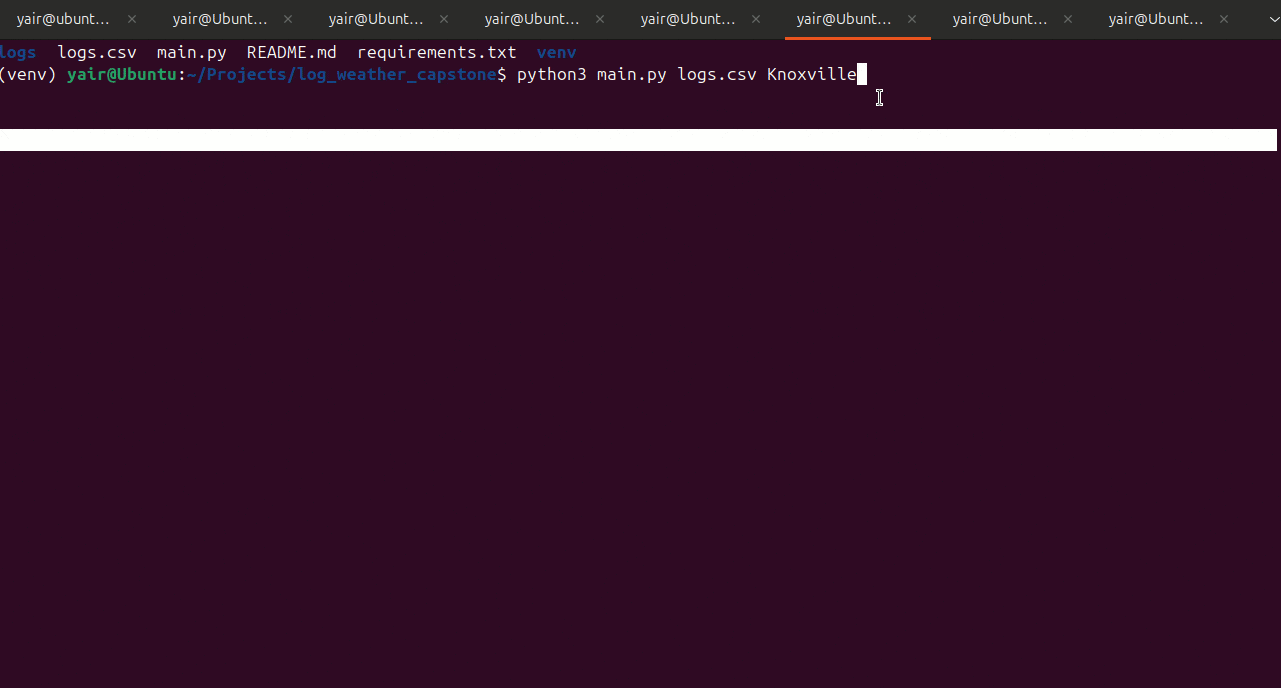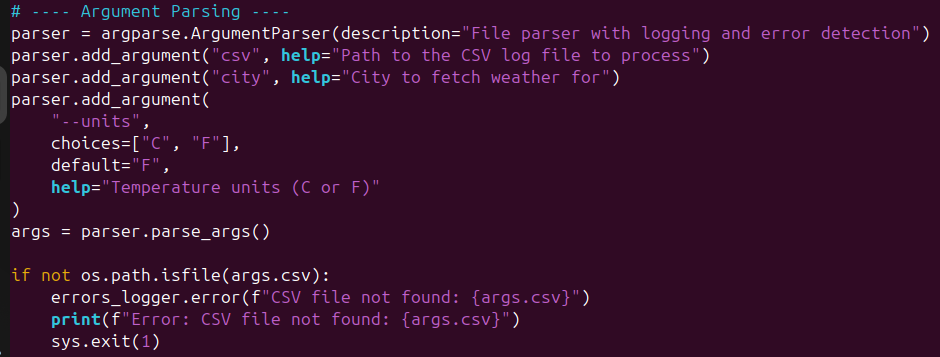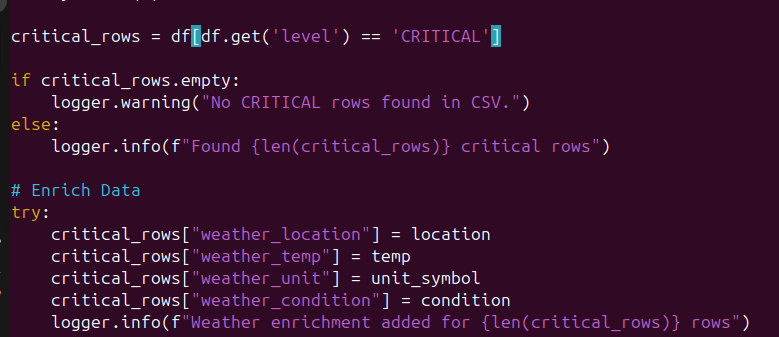What this is
A Python-based log parser and weather enricher. It demonstrates how to combine multiple Python libraries in a single, cohesive workflow: CLI argument parsing, logging, CSV processing with pandas, live API integration, defensive error handling, and automated exporting/archiving.
Purpose: skills practice and demonstration. This is a conceptual exercise to learn, integrate, and ship a clean, original script
Below is a demonstration of the script in action.

Tech stack
- Python (3.x)
- pandas – CSV parsing & data enrichment
- requests – Weather API calls
- python-dotenv – load
WEATHER_API_KEYfrom.env - argparse – CLI interface
- logging – structured logs:
main.log,errors.log,export.log - zipfile – package outputs
- Standard libs:
os,sys,json,time,datetime,pathlib
What the script does
- Accepts CLI input
python3 main.py logs.csv "Tokyo" --units Ccsv: path to input log filecity: city for live weather lookup--units:CorF(defaultF)
- Reads logs & filters only
CRITICALrows with pandas. - Pulls live weather (current temp + condition) from a public API using an API key loaded from
.env. - Enriches each
CRITICALentry with the weather fields. - Exports the result as timestamped
CSVandJSON, then zips both into a single archive.
Example outputs:critical_with_weather_YYYYMMDD_HHMM.csvcritical_with_weather_YYYYMMDD_HHMM.jsoncritical_with_weather_YYYYMMDD_HHMM.zip
- Logs the lifecycle (start/end, API attempts, errors, export/zip steps) to dedicated log files.
Development log (Parts 1–3)
Part 1 — Argument parsing & logging foundation
Goal: My goal for part 1 was to establish a solid base so the script accepts user input and reports progress/errors consistently. Here’s what i did
- Implemented positional CLI args (
csv,city) and optional--units. - Validated input file exists; fail fast with a clear message.
- Built a split logging system:
main.log– info/progresserrors.log– warnings/errorsexport.log– export/packaging events (set up here for later phases)
- Logged Script start/end for clear lifecycle markers.
- Note: I implemented this on my own first, then used AI for polish and troubleshooting (e.g., avoiding multiple
basicConfig()pitfalls and separating concerns with dedicated loggers).
Part 2 — Resilience + enrichment
Focus: Make the script resilient and enrich the filtered data with live weather info.
- Constructed the Weather API URL using the CLI city and
WEATHER_API_KEYfrom.env. - Added retry logic with a short delay for transient request failures.
- Robust exception handling for:
- missing/invalid CSV
- empty CSV or bad format
- request failures/timeouts
- invalid JSON or missing keys
- Filtered
CRITICALrows via pandas; handled “no CRITICAL rows” gracefully. - Enriched the filtered DF with
weather_location,weather_temp,weather_unit,weather_condition.- Used
.copy()before enrichment to avoidSettingWithCopyWarning.
- Used
- Exported to CSV and JSON (initially with static filenames).
Parts 3 Export polish & packaging
Focus: Professionalize the export flow and user experience.
- Timestamped filenames (
YYYYMMDD_HHMM) for CSV/JSON to avoid overwrites and aid traceability. - Zipped exports into a single archive for clean delivery.
- Used
arcname=os.path.basename(...)inzipf.write()so the ZIP contains just file names, not host paths. - Prompted the user (yes/no/quit) whether to delete the original CSV/JSON after zipping.
- Expanded export lifecycle logging (file creation, zip success, cleanup).
- Ensured clean terminal output and avoided pandas warnings by working on a copied DF.
Troubleshooting & decisions
1) pandas filter/enrich bug
- Original attempt (buggy):
critical_rows = df[df.get('level') == 'CRITICAL']df.get('level')here is wrong usage; and modifying a filtered view later can triggerSettingWithCopyWarning.
- Final fix:
critical_rows = df[df['level'] == 'CRITICAL'].copy()- Use column selection via
df['level']and create a copy before mutation.
- Use column selection via
2) ZIP contents & “zip slip” learning
- Original zipping:
- This can store full/relative paths as-is.

- Reviewed and improved:

- I reviewed this choice and learned about zip-slip (a path traversal vulnerability during extraction).
- My script only creates archives, it doesn’t extract them, so it’s not directly vulnerable.
- Still, using
arcname=os.path.basename(...)is a no-downside best practice that keeps archives clean and predictable.
Code walkthroughs (with line-by-line explanations)
Walkthrough A — CLI parsing & early validation

Line by line
ArgumentParser(...): creates a CLI interface with a helpful description.add_argument("csv"): required positional argument for the input CSV path.add_argument("city"): required positional argument for the target city.add_argument("--units", choices=["C","F"], default="F"): optional flag constrained toC/F.args = parser.parse_args(): parses actual CLI values intoargs.if not os.path.isfile(args.csv): fail fast if the file doesn’t exist.errors_logger.error(...): record the problem inerrors.log.print(...)+sys.exit(1): inform user and exit non-zero.logger.info(...): confirm the CSV is found inmain.log.
Why this matters
- Clear contracts for how to run the script.
- Early, explicit validation and structured logging improve UX and debuggability.
Walkthrough B — Weather API request with retry + parsing
url = f"https://api.weatherapi.com/v1/current.json?q={args.city}&key={API_KEY}"
for attempt in range(3):
try:
response = requests.get(url, timeout=5)
if response.status_code == 200:
break
else:
logging.warning(f"Attempt {attempt+1}: API returned {response.status_code}")
except requests.exceptions.RequestException as e:
logging.warning(f"Attempt {attempt+1}: {e}")
time.sleep(2)
else:
print("All attempts failed.")
errors_logger.error("All API attempts failed.")
sys.exit(1)
data = response.json()
location = f"{data['location']['name']}, {data['location']['country']}"
temp, unit_symbol = (
(data["current"]["temp_f"], "°F") if args.units == "F" else (data["current"]["temp_c"], "°C")
)
condition = data["current"]["condition"]["text"]
Line by line
- Build
urlusing user-providedcityand secretAPI_KEY. for attempt in range(3): bounded retry loop.requests.get(..., timeout=5): prevent hanging; fail fast.if response.status_code == 200: break: success path exits the loop.logging.warning(...): log non-200s and network exceptions.time.sleep(2): small backoff between attempts.else:on thefor: runs only if loop neverbreaks; we bail with log + exit.response.json(): parse JSON payload (exception-handled in the full script).- Extract
location, choose temp by unit, and getcondition.
Why this matters
- Solid network hygiene (timeouts, bounded retries).
- Clean separation of transport errors vs data parsing.
- Reliable behavior under flaky networks.

Walkthrough C — Filter & enrich safely with pandas
df = pd.read_csv(args.csv)
critical_rows = df[df['level'] == 'CRITICAL'].copy()
critical_rows.loc[:, "weather_location"] = location
critical_rows.loc[:, "weather_temp"] = temp
critical_rows.loc[:, "weather_unit"] = unit_symbol
critical_rows.loc[:, "weather_condition"] = condition
Line by line
pd.read_csv(...): load the input logs into a DataFrame.df['level'] == 'CRITICAL': boolean mask for the target rows..copy(): create a new, writable DataFrame to avoid view/assignment issues..loc[:, "weather_location"] = ...: column-wise assignment (explicit, clear).- Repeat for
weather_temp,weather_unit,weather_condition.
Why this matters
- Demonstrates correct pandas filtering and mutation without
SettingWithCopyWarning. - Keeps the original
dfuntouched while producing a clean enriched subset.
Reflection:
Compared to my Nmap Dashboard project, I used AI less here:
- I wrote most of the code myself, then used AI for polish, debugging, and second opinions.
- When AI suggested alternatives, I researched and decided deliberately (e.g.,
.copy()to avoid chained assignment issues,arcnamefor ZIP hygiene). - The process helped me go a layer deeper into Python and pandas; I can now read and explain everything I wrote and most AI suggestions I kept.
How to run
python3 -m venv venv
source venv/bin/activate
pip install -r requirements.txt
# create .env with your API key
echo 'WEATHER_API_KEY=your_api_key_here' > .env
# run the script
python3 main.py logs.csv "Tokyo" --units C
Outputs
critical_with_weather_YYYYMMDD_HHMM.csvcritical_with_weather_YYYYMMDD_HHMM.jsoncritical_with_weather_YYYYMMDD_HHMM.zip
TRY IT OUT AT https://github.com/yairemartinez/Log-Parser-Weather-Enricher
Closing Summary
Working through this capstone gave me confidence in handling end-to-end Python scripting projects from parsing input to enriching data, handling errors, exporting results, and securing the workflow. While the script itself is conceptual, the process taught me transferable skills: how to think about data pipelines, build resilient code, and apply security-minded decision making.
THANKS FOR READING. 🙂